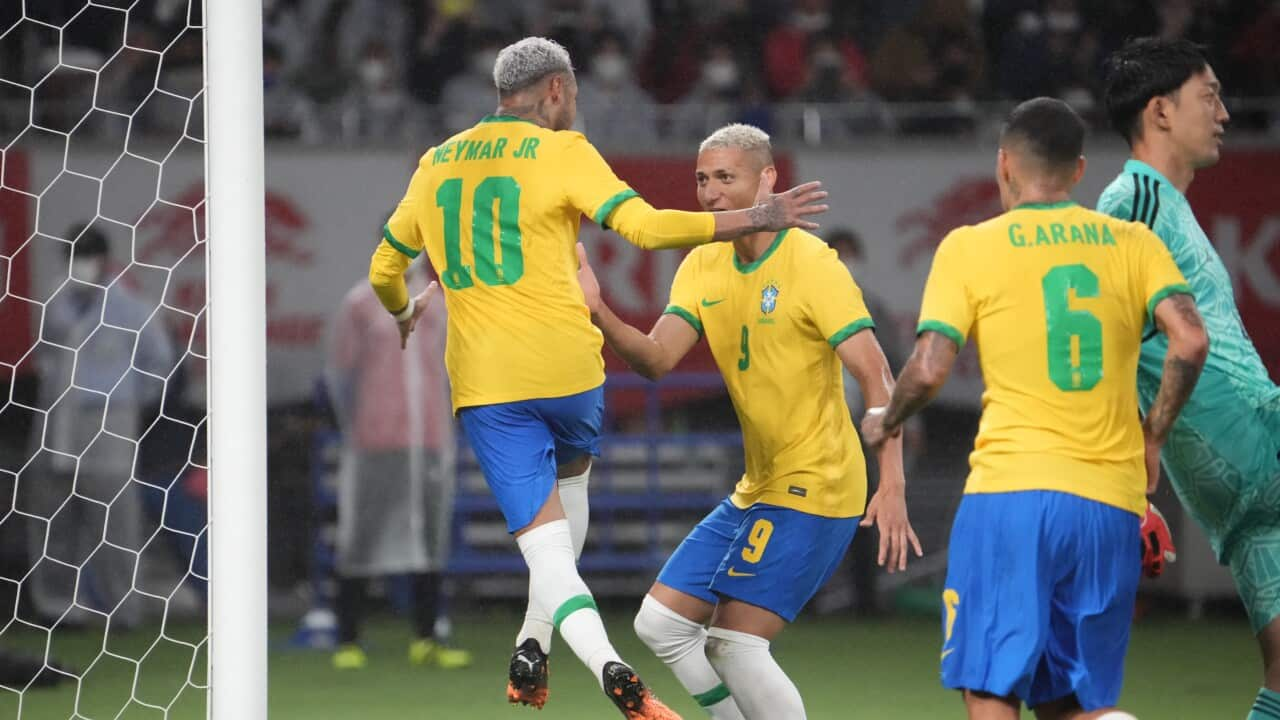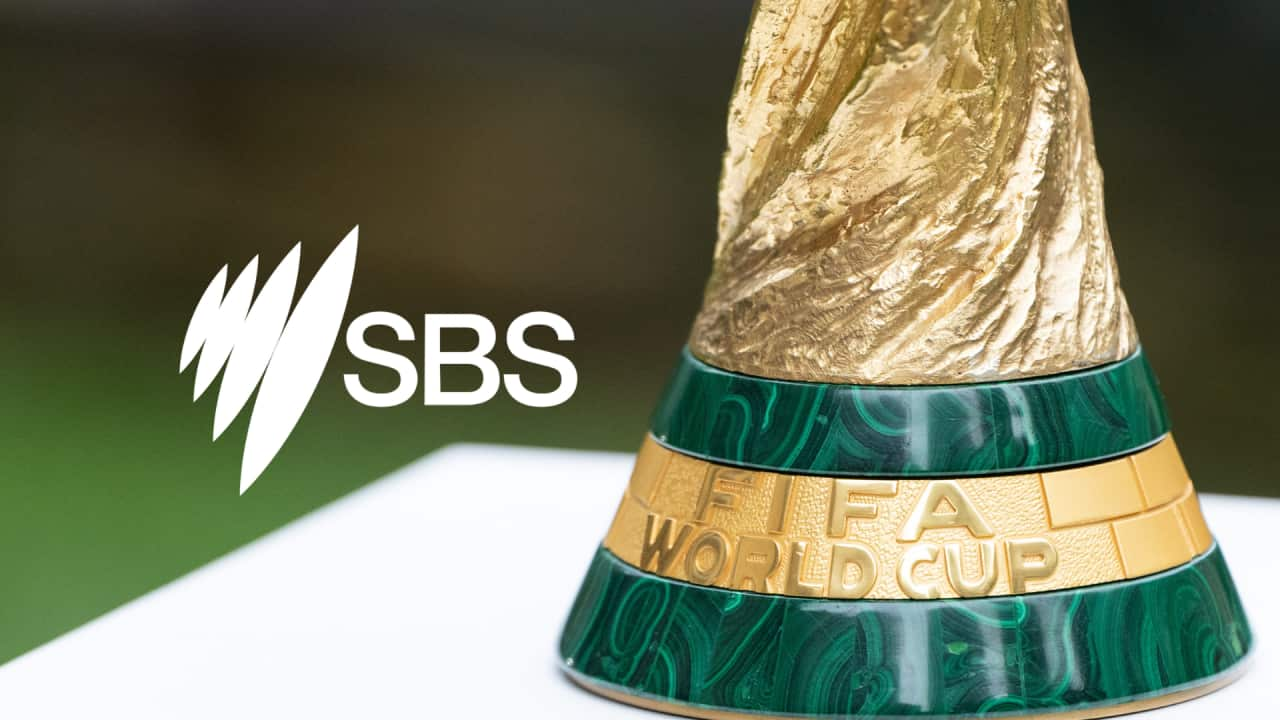Create your to stream all 64 matches of the FIFA World Cup 2022ᵀᴹ live and free any time on your favourite device.
Star power
When it comes to stars on show in Qatar, look no further than Brazil. Not only do the South American side boast world class talent across the park, their attack holds three of the greatest players on the planet, and with it, their key to World Cup success.
Neymar will make his third consecutive World Cup appearance off the back of his stellar club form with Paris Saint-Germain. The 31-year-old has netted eight goals from as many appearances to open his account this season in Ligue 1, almost equalling his 13-goal showing from an injury-riddled 2021-22 season.
Meanwhile, Real Madrid winger Vinicius Jr. is set to make his maiden appearance on the world stage, with his breakout, 17-goal 2021-22 season deserving of nothing less as the 22-year-old impressively matched the prolific attacking record of French teammate Karim Benzema, that season's leading goalscorer in La Liga.
Since making the switch from Manchester City to league rivals Arsenal, Brazil regular Gabriel Jesus has blossomed as the lone striker atop Mikel Arteta's 4-2-3-1 formation, allowing for his speed and creativity to stand out amid the Gunners' league-topping start to the season.
Nineteen-time goalscorer for Brazil, Jesus could be joined by fellow Premier League stars Roberto Firmino and Fabinho from Liverpool as well as Manchester United midfield duo Fred and Casemiro, while Aston Villa's Philippe Coutinho is also a chance of holding onto his starting position from Russia.
Should the attacking records of these players collide in Qatar, the South Americans could be ruthless up front come November.
Better lead-in than Russia 2018
Brazil will enter the 2022 World Cup in similar, albeit better form than their previous campaign on the world stage.
The South Americans went undefeated in their qualification campaign to Qatar, winning 14 matches and drawing just three in comparison to their 2018 effort, where they still topped the CONMEBOL qualifying proceedings but fell 2-0 to Chile in their first match.
En route to securing the 2019 Copa America title and coming agonisingly close once again in 2021, where they fell to Argentina in the final, the Brazilians lost just two more times since their Russia campaign; compared to the four losses and one penalty-shootout defeat in the lead-up to the 2018 tournament.
Opponent familiarity
One of the reasons Brazil will be able to tear it up in the group stage and carry that form into the knockouts is due to their familiarity with their first three opponents.
In bizarre circumstances, two groups in the World Cup will be near identical to their 2018 counterparts as France, Denmark and Australia all face each other again in Group D; while Brazil, Switzerland and Serbia also meet in the group stage for the second time in a row as Cameroon take the place of Costa Rica from the previous tournament.
The South Americans opened their 2018 campaign against the Swiss with a tightly contested 1-1 draw, although Brazil would have walked away feeling robbed of a victory after Steven Zuber appeared to push Miranda in the back upon scoring the equaliser, and Gabriel Jesus was denied a late penalty as the side came agonisingly close to finding a winner on numerous occasions.
Serbia were eliminated from Russia in their final group match at the hands of Brazil, who walked away comfortable 2-0 winners courtesy of goals from Paulinho and captain Thiago Silva.
Despite Cameroon’s absence from the 2018 finals, the CAF affiliates did come up against the 2014 host nation in the group stage of their previous World Cup appearance, where they fell 4-1 to a rampant Brazil in their third loss of the campaign from as many matches.
Not only will the South American side be well acquainted with their three group stage opponents from past encounters, the argument could also be made that the opposition set-ups will not be that different from the last time each of them met.
While Switzerland’s more defensive approach under then manager Vladimir Petković worked wonders at the 2020 Euros, where their 5-3-2 formation steered them to a maiden quarter-final appearance, Murat Yakin has reverted to the familiar 4-2-3-1 set-up of their 2018 campaign since taking the coaching reigns last year, which will likely feature Swiss mainstays Xherdan Shaqiri, striker Haris Seferovic and centre-back Manuel Akanji once again.
Serbia have gone in a more attacking direction since the appointment of Dragan Stojković at the start of last year, employing a more open 3-4-3 set-up to support the astounding goalscoring form of Dušan Vlahović and Fulham talisman Aleksandar Mitrović, with captain Dušan Tadić and Sergej Milinković-Savić of Lazio playing in behind.
However, the tactical switch may have also come in light of the international retirement of 2018 captain Aleksandar Kolarov, all-time appearance-holder Branislav Ivanovic and Nemanja Matić of Roma all within the same 12-month period.
Surprisingly, Cameroon still have a couple of holdovers from their 2014 squad in Eric Maxim Choupo-Moting from Bayern Munich and captain Vincent Aboubakar, aged 33 and 30 respectively, but a host of big-name retirees since then in Joel Matip, Alex Song and Nicolas N'Koulou would have left many pondering how strong the Cameroonians could have been had the players’ dissatisfaction with the national team set-up not forced them into premature international retirement.
The challenge that will be set by the familiar faces and structures of their group-stage opponents will hold the South Americans in good stead for the knockout stages, beginning with the round of 16 where they are likely to face either Portugal or their CONMEBOL affiliates Uruguay, who are currently ranked ninth and 13th in the world respectively.
However, the Cristiano Ronaldo-led side have won just four out of 19 matches against the Seleção in international history, while the Uruguayans proved far from a challenge for Brazil during qualification, losing on both occasions which included a 4-1 drubbing.
The form in which Brazil are likely to garner through a challenging group stage is why they will have one eye on the trophy come the start of the knockouts in Qatar.
Squad will be better than Russia 2018
Granted the Seleção stay injury free over the next two months, Tite will take a much-improved side to Qatar from the 23-man squad selected for Russia 2018.
While Brazil have kept eight of their 23 players from that tournament as per their most recent squad, it is the countless new additions which have breathed new life into the side, with their pace, energy and youth a welcome change to the host of veteran players who took up a large portion of the squad last time out.
Thiago Silva’s centre-back partner in Russia, Miranda, has since made way for Paris Saint-Germain’s Marquinhos who was largely bench-bound at the previous World Cup.
Éder Militão from Real Madrid is also likely to start at centre-back in either Silva or Marquinhos’ absence, having teamed up with the latter for both their most recent friendly against Japan and their final tournament qualifier against Bolivia, where they kept clean sheets in both.
The re-energised attack will see veterans Paulinho and Willian make way for a revolving door of exciting young talent, where Premier League forwards Richarlison (Tottenham Hotspur) and Antony (Manchester United), and Barcelona’s Raphina, look to challenge the likes of Vinicius and Jesus for a starting berth alongside Neymar.
While these new additions pose a frightening proposition to Brazil’s group stage opponents, it is in defence where the South Americans are equally likely to shine. Not only will they have a host of world-class centre-backs to choose from, they will also have the likes of Alex Telles, Alex Sandro, Danilo and potentially even 39-year-old Dani Alves at full-back.
This will be key to shutting down Serbia’s Mitrovic in their opening match, Seferovic in their match-up with Switzerland and Cameroon’s veteran strike duo in their final game of the group stage.
This familiarisation with such opposition should leave the Brazilian defence well placed to hold off the respective attacks of their group stage opponents, as all four players failed to score in their last encounter with the South American side.
It is ultimately the strength and depth evidenced across all areas of the Brazil squad that will hold them in good stead when progressing through to the knockout stages, where their early momentum will prove pivotal heading into the business end of the tournament.
However, heading into the conversation of World Cup hopefuls from South America, many will scream the name of 2014 finalists Argentina.
Currently ranked third in the world, the Argentinians breezed through qualifying as they went undefeated like Brazil, albeit with six draws compared to the Seleção's three.
Lionel Scaloni's side have also got the better of the Brazilians in two of their previous three encounters, the most notable being last year's Copa America final where Angel Di Maria's first-half strike was enough to lift the trophy for Argentina.
However, the greatest challenge for Brazil's CONMEBOL affiliates this time around lies in the knockout phase, where La Albiceleste could face 2018 winners France in the round of 16 should one of the sides fail to top their group, and could even come up against the likes of Germany, Spain, Serbia, Switzerland or even Brazil in the quarter-finals.
While Argentina, a side also full of stars including Lautaro Martinez and captain Lionel Messi, stand a strong chance in Qatar, I am led to believe that if there is one South American team who have the ability, the players and the pre-tournament form to finally end the continent's World Cup drought, it is going to be Brazil.



